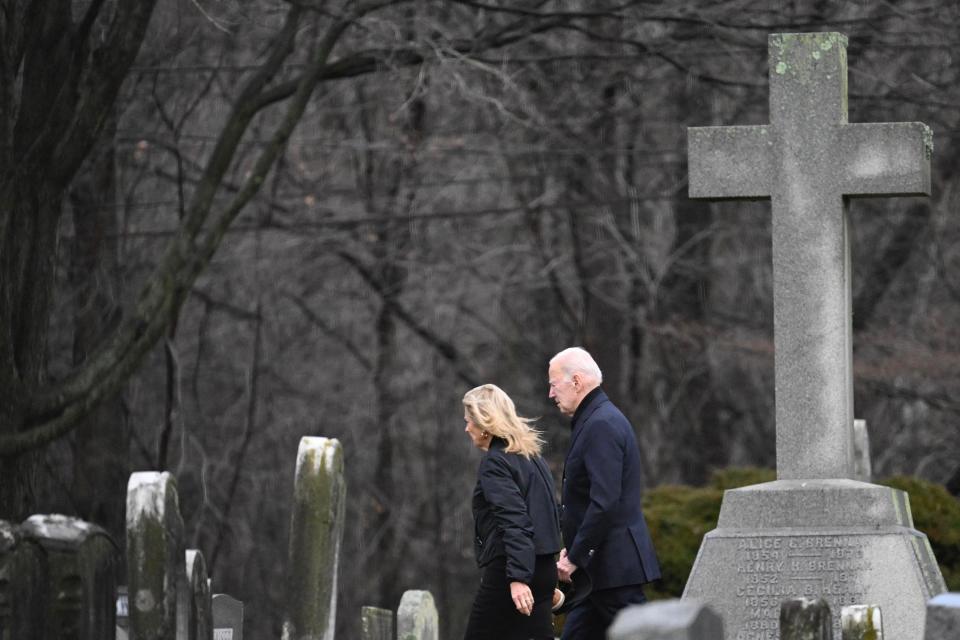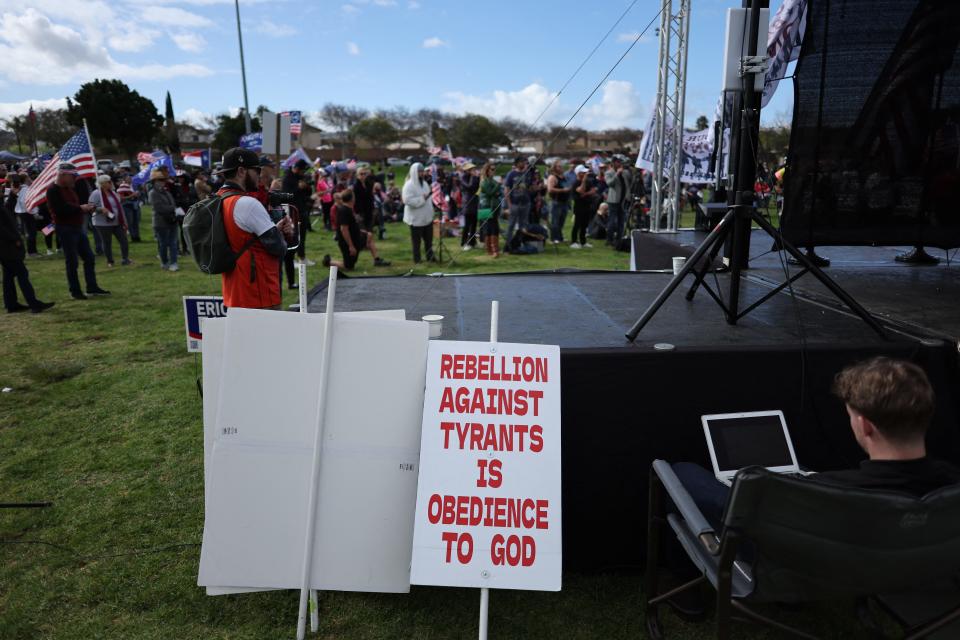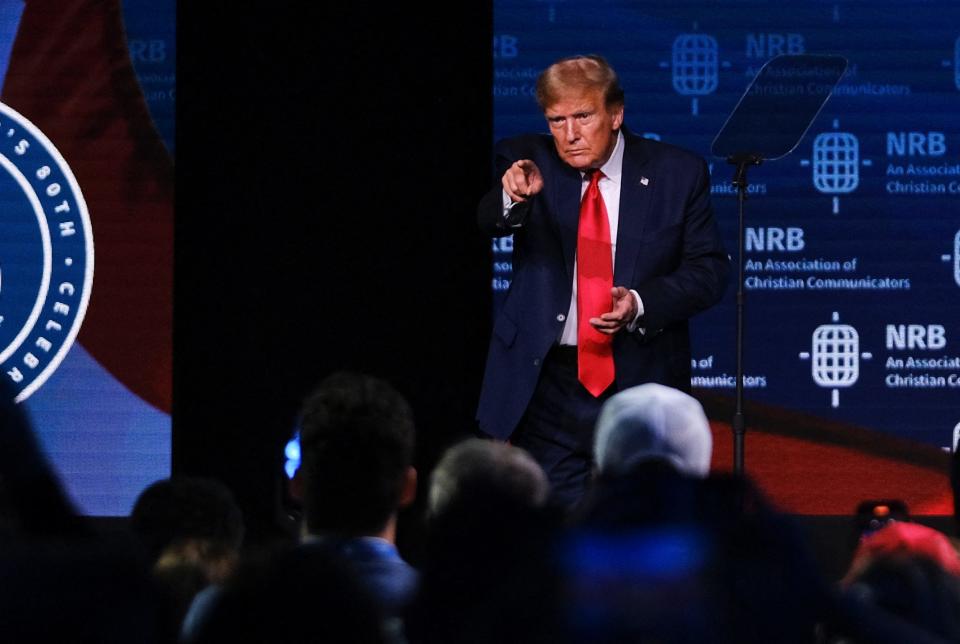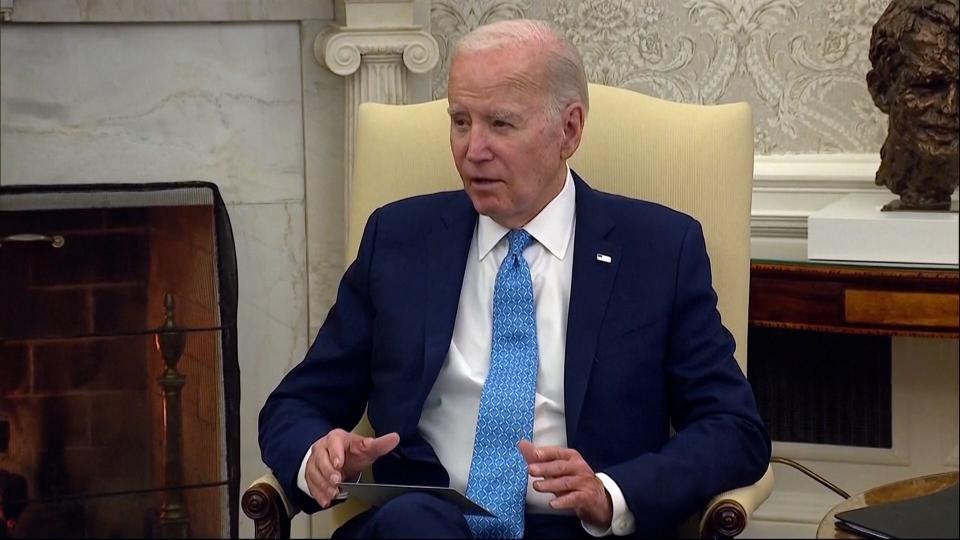Americans want a religious president. They just don't see Trump or Biden that way.
Joe Biden, America’s second Catholic president, is often the subject of media coverage when he regularly attends church.
Donald Trump’s best known trip to church came in June 2020, during his one term as president, when he walked from the White House to a nearby Episcopal church – after police forcibly cleared protestors angry about racial injustice – so he could hold up a bible for a photo op.
Does religion factor into who people vote for president? Does it matter that Biden is a church-goer and Trump is a Bible waver?
A Pew Research Center survey released last week found that 94% of Americans say it is very important or somewhat important for a president to live a moral and ethical life.
But, of the 12,693 people questioned in that survey last month, just 13% see Biden as “very religious” while only 4% see Trump that way. Religion is a perplexing component in this year’s Biden-Trump rematch. And the more religious Americans say they are, the more marginalized they say they feel.
That sounds like good news for Trump. But the survey held some hope for Biden too.
The Pew survey found tension among the faithful, worried that religion is losing influence in public life. But how could it not? If people of faith say that is important but vote for candidates who don't come close to living that sort of life, they're sealing there own irrelevancy with their ballots.
Democrats don't see Biden as very religious

Greg Smith, Pew's associate director of religious research, told me he was surprised that the survey found that three out of four Democrats don't see Biden as very religious, even as they support him.
A Pew survey released three years ago this month found that a healthy majority of Americans, 58%, knew Joe Biden is Catholic, including 55% of Republicans and 63% of Democrats. And 27% of those surveyed then said Biden was very religious.
"So it's half of what it was shortly after his inauguration," Smith said of the new survey.
He said media coverage of Biden's church visits during the 2020 campaign might have heightened awareness about his faith.
Biden or Trump? I ran for president as a Republican in 2024. I won't vote for Trump (or Biden).
There's also the U.S. Supreme Court's June 2022 ruling to overturn constitutional protections for abortion, which Biden and the Democrats have openly decried and successfully exploited for votes in elections since them.
Biden may be paying a religious price for holding Trump, who nominated the court's hard-right supermajority, responsible for restricting abortion rights.
Americans don't know what Christian nationalism is – or that they seem to support it
Another surprise for Smith – 54% of those surveyed have not heard of Christian nationalism, the belief that American government should be guided by or even controlled by Christian scripture.
That number has remained the same since a Pew survey in September 2022, despite plenty of media coverage since then of Trump's embrace of Christian nationalism.
"There hasn't been any discernible increase in people's knowledge of Christian nationalism, their awareness of it, despite the conversation about it in the in political coverage," he said.

They may not have heard of it. But plenty of them liked its key components.
The survey found that 42% of Republicans and people who lean toward that party said that when the Bible and the will of the people conflict, the Bible should have more influence over American's laws.
Among white evangelical protestants, that number jumps to 64%, Smith said, while 61% of Hispanic protestants and 49% of Black protestants agreed.
This flies in the face of the First Amendment's opening clause, 16 words that guarantee Americans have freedom of – and from – religion. "Congress shall make no law respecting an establishment of religion, or prohibiting the free exercise thereof," that amendment reads.
Evangelicals continue to contradict themselves on Trump

As I wrote last month, Trump has a strictly transactional relationship with many voters who identify as white evangelicals. They don't care about his personal life, his transgressions with extramarital affairs and hush-money payments to porn stars. They think he has their back. That's all it takes.
The Pew survey demonstrates that, even as evangelicals contradict themselves. Seventy percent of white evangelicals said it is important to have a president who shared their beliefs. But they give Trump a pass on that.
"They do not think he's very religious himself," Smith said of the survey, which found 6% of white evangelicals see Trump as "very religious."
What about Trump's 'faith'? Trump's questionable morality gets a pass from evangelical voters. I decided to ask why.
But they embrace him – 67% of those evangelicals had a favorable view of Trump while 86% of them had an unfavorable view of Biden.
"They don't think he's personally religious himself, but they do think he is standing up for them, standing in for them, standing up for people with religious beliefs like theirs," Smith said.
Americans are conflicted by how much religion is or isn't influencing the country
Trump campaigns as a divider, with-me-or-against-me bombast blaring at every rally. Maybe that has appeal now to people who see themselves as religious, and feel aggrieved about it.
Four out of five of the people surveyed see religion losing influence in public life and nearly half see that as a bad thing. There was also a predictable split between progressives who complained about religious overreach in society and conservatives who think religion has been shut out of important institutions like government and public schools.
Pence won't endorse Trump: Mike Pence anointed Donald Trump as God's leader. He can't take that back.
Just under half of those surveyed feel some sort of conflict between their religious beliefs and mainstream American culture, with 29% feeling like a minority due to their beliefs and 41% saying its best to not discuss religion with someone they disagree with.
"So across a bunch of these measures, and across a variety of religious groups," Smith said, "we see signs of a growing tension between how people see their own religious convictions fitting in broader society."
Smith heard in that an echo of a survey Pew released last month, which found that 71% of Americans think their political party is losing more than it is winning on issues that matter to them. That included strong majorities for both Republicans (83%) and Democrats (62%.)
Hyper-partisanship extends from the polling place to the place of worship, it seems.
How Trump can help Biden with the issue of Gaza

Some bright spots for Biden – 66% of Black protestants hold a favorable view of him while 80% dislike Trump. And 62% of the Jewish people surveyed like Biden while 79% dislike Trump. Biden is winning with atheists too – 59% like him and 88% dislike Trump.
Both men in similar spots overall in the survey when all faiths are considered, with Biden seen as favorable by 37% and unfavorable by 62% and Trump is seen as favorable by 39% and unfavorable by 60%.
And there are still political minefields ahead for Biden, who is trying to negotiate America's role in Israel's military intervention in Gaza after the Oct. 7 terrorist attacks from Hamas. That has driven a wedge into Biden's coalition of voters of many faiths, who are angry about civilian deaths and a burgeoning humanitarian crisis in Gaza.
Biden's best, and unlikeliest, ally in overcoming that is Trump.
Opinion alerts: Get columns from your favorite columnists + expert analysis on top issues, delivered straight to your device through the USA TODAY app. Don't have the app? Download it for free from your app store.
The former president appeared Monday on the radio show hosted by his former White House advisor, Seb Gorka, who asked about Senate Majority Leader Chuck Schumer, a New York Democrat, calling for new elections in Israel.
Trump could not resist using the question to smear Jewish Democrats.
“Any Jewish person who votes for Democrats, they hate their religion, they hate everything about Israel, and they should be ashamed of themselves because Israel will be destroyed," Trump said.
That drew plenty of attention and condemnation, which Biden's campaign was happy to recirculate.
But Trump's first rule of politics is never admit a mistake. So his campaign quickly doubled down with hyperbole that bordered on hysteria, accusing Democrats of turning "into a full-blown anti-Israel, anti-Semitic, pro-terrorist cabal."
Biden should pray that Trump keeps talking that way.
Follow USA TODAY elections columnist Chris Brennan on X, formerly known as Twitter: @ByChrisBrennan
You can read diverse opinions from our Board of Contributors and other writers on the Opinion front page, on Twitter @usatodayopinion and in our daily Opinion newsletter.
This article originally appeared on USA TODAY: Are Trump, Biden religious? Americans don't think so. That's a problem
